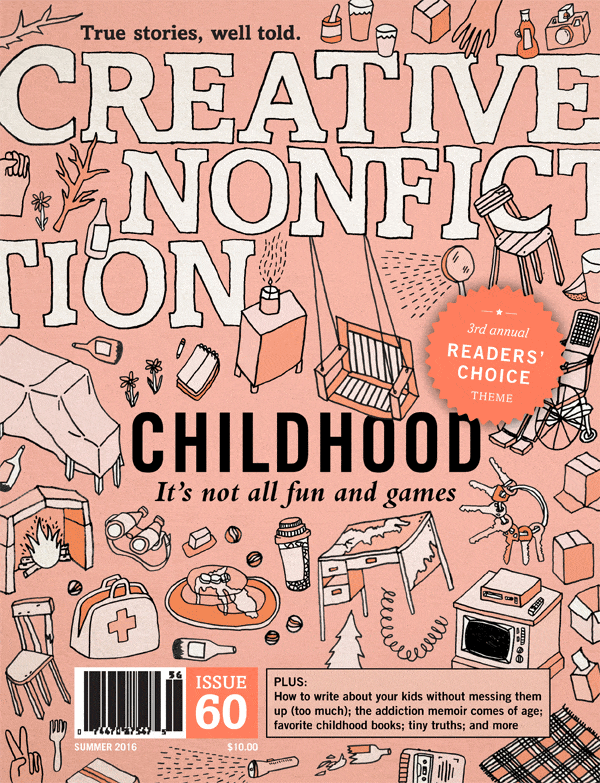Issue 60 / Summer 2016

60 / Childhood
The good, the bad, and the biting truth
In this issue, we’re taking a look through the rear-view mirror at childhood—and, in the process, examining how it shapes us into our adult selves. The writers featured in Creative Nonfiction #60 recount formative childhood experiences that leave indelible memories: stomping through a snowstorm to Sunday mass; discovering a dead body in the woods; touring beautiful homes they’ll never live in; or trying, desperately, to dance their way to junior high popularity. Here we have kid-dom in all its messy glory: the good, the bad, and the biting truth.
Plus, fifteen contemporary nonfiction authors discuss the books that made them writers; how to write about your kids without messing them up (too much); the link between addiction memoirs and coming-of-age stories; Tiny Truths; and more.
Already a subscriber?
Read this issue nowTable of Contents
What’s the Story #60
There are lovely moments of childhood, but the stories we most remember are sad or even tragicBefore We’re Writers, We’re Readers
Fifteen contemporary nonfiction writers recall the formative nonfiction (and not-quite-nonfiction) books of their childhoodsI Survived the Blizzard of ’79
A big snow is fun—as long as you don't have to leave the houseThe Walk Home
A complicated flirtation with an older neighborThe Red Caboose
The white kids liked to watch him dance, but only from a distanceSunday Drive
House Hunters: Imaginary EditionSuds
You never forget your first dead bodyToys
A virtual tour of the National Toy Hall of FameWe Wanted Everything
There are some secrets sisters never tellDangerous [Language]
A young teacher tires of hearing "boys will be boys"Writing Motherhood
Parenting blogs and magazines have become ubiquitous, but is the literature of motherhood still undervalued?How to Write About Your Kids Without Messing Them Up
We’re sorry; we’re currently unable to make this work available online.Addiction Memoir, or Coming-of-Age Story?
Charting his troubled youth against the publication of notable addiction memoirs, Kenneth R. Rosen finds a map to adulthood[See: n, Below]
The ABC's of a childhood darkened by abuseRejecting Perfectionism
"Making drawings is the most erratic process"True Empathy or Understanding Is Rare
An interview with the winner of the $1,000 "Childhood" essay contest
